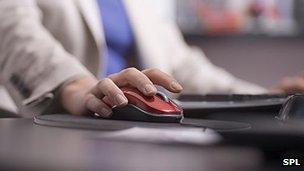Going paperless 'would save NHS billions'
- Published

Health Secretary Jeremy Hunt wants the NHS to be paperless by 2018 - a move a report says could help save the health service billions of pounds a year.
In a speech, Mr Hunt will say a first step is to give people online access to their health records by March 2015.
And by April 2018, any crucial health information should be available to staff at the touch of a button.
PwC suggests a potential £4.4bn could be put back into the NHS with better use of information and technology.
This information technology revolution has been long in the offing.
It was Mr Hunt's predecessor Andrew Lansley who first pledged in 2010 to start an information revolution, external to ensure patients could use the web to report their experiences, rate NHS organisations and access their records so there would be "no decision about me, without me".
A couple of years on and progress has been patchy, with some parts of the NHS offering a big digital presence and others lagging.
Previous attempts to transform NHS information technology have run into trouble. Labour's scheme, Connecting for Health, allowed X-rays and scans to be stored and sent electronically.
But other parts of the programme - launched in 2002 - became mired in technical problems and contractual wrangling and the national programme has effectively been disbanded and local parts of the health service asked to proceed with upgrading IT systems.
Priorities
In a speech to think tank Policy Exchange, Mr Hunt will say hospitals should plan to make information digitally and securely available by 2014-15.
This will means that different professionals involved in one person's care can start to share information safely on their treatment.
"We need to learn those lessons - and in particular avoid the pitfalls of a hugely complex, centrally specified approach. Only with world-class information systems will the NHS deliver world-class care," he will say.
Mr Hunts comments come as a report by PwC suggests a potential £4.4bn could be put back into the NHS by using better use of information and technology.
Using electronic prescribing and electronic patient records would also give staff more time to spend with patients.
The John Taylor Hospice near Birmingham found that using laptops more than doubled the amount of time clinicians could spend with patients.
Labour says the public will struggle to understand why the government is making information technology a priority at a time when NHS spending has been cut.
Labour's shadow health minister, Jamie Reed, said: "As winter bites, the NHS is facing its toughest time of the year and the government has left it unprepared.
"Patients are waiting too long in A&E and being treated in under-staffed hospitals - they will not thank him for making this a priority. He should sort out the bread and butter issues first."
- Published16 January 2013
- Published26 October 2012
- Published21 May 2012